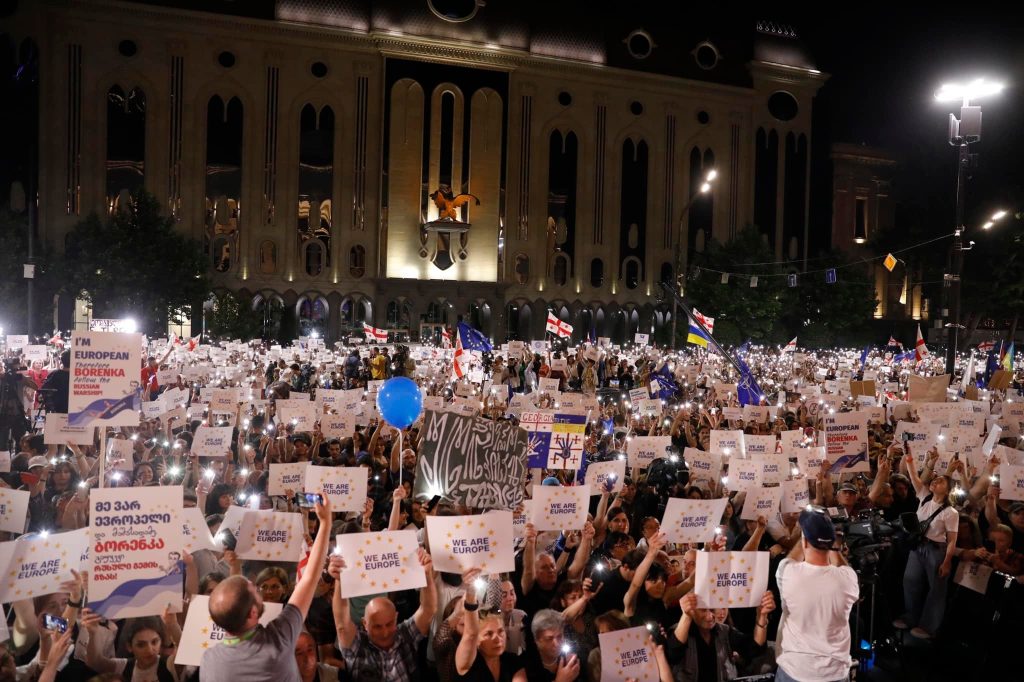Tens of thousands of Georgians rallied on Shota Rustaveli Avenue, Tbilisi’s main thoroughfare, on June 20 to support Georgia’s accession to the European Union and protest against what they saw as the Georgian Dream government’s deliberate failure to secure the EU candidacy.
Under the slogan “Going Home to Europe” the March for Europe was organized by the activist group Shame Movement. The organizers say they wanted to send a pro-European message to Brussels, where 27 Member States in the EU Council will make their final decision on Georgia’s EU bid on June 23-24.
A few days ago, on June 17, the European Commission recommended giving “the European perspective” – that is, the potential right to accession – to Georgia. The Commission fell short of suggesting the candidacy, which it recommended both for Ukraine and Moldova. The Commission said Tbilisi should first meet a set of conditions, including depolarization, comprehensive justice reforms, and “de-oligarchization” before being accepted as a candidate.
🇬🇪🇪🇺 Anthem of Europe 'Ode to Joy' performed outside Georgia's Parliament.
📷 Nino Khutsidze pic.twitter.com/JFV88J18WE
— Civil.ge (@CivilGe) June 20, 2022
At the massive rally, Shota Dighmelashvili, Shame Movement’s leader, read out a manifesto vowing to begin a new popular movement “that will bring our homeland back home, to Europe.”
The manifesto reads: “the Georgian people fully realize, and the EU also confirms that oligarch Bidzina Ivanishvili is the major hindrance on Georgia’s way to Europe,” referring to governing Georgian Dream party founder and ex-PM, who is widely seen to be pulling strings behind the scenes.
The manifesto calls for creating a National Council of the new popular movement, which should include various civil society and media organizations, political parties, students, and trade unions, and will present its demands to the government. The protesters pledged to gather again on June 24 as the European Council announces its decision.
The rally was also addressed by civil activists, artists, and students, as well as Georgian fighters in Ukraine, and Members of the European Parliament. The partisan political leaders were shunned.
- Georgia’s Pro-Europe Protesters Appeal EU Council
- In Photos | Massive Pro-EU Rally in Tbilisi
- “Georgian, Therefore European” — Thousands Rally for Europe in Tbilisi
At around 23:00, the crowd of thousands symbolically marched towards the Europe Square carrying large Georgian, European, Ukrainian, and Moldovan banners. At the end of the protest, around midnight, protesters chalked the messages in support of European integration at the Europe Square.
The estimates of the size of the rally vary from 50,000 to 120,000. Besides the capital, Georgians hit the streets across the country – in much smaller numbers – in Kutaisi, Batumi, Zugdidi, and Ozurgeti towns, as well as abroad in Berlin, Vienna, and Brussels, among others.
Major opposition parties have backed and participated in the demonstration. Former PM Giorgi Gakharia’s For Georgia party stayed out. Even though it supports EU membership, the choice of date sat ill with the leader. On Gakharia’s watch as Interior Minister, the police crackdown on the anti-occupation rally on June 20, 2019, left many injured and gave birth to the Shame Movement.
Background
Georgia applied for the EU membership on March 3, shortly after Ukraine which came under Russia’s full-scale attack on February 24. Moldova also applied on the same day.
Last week, the Commission said it will assess Georgia’s implementation of recommendations and conditions by the end of 2022, meaning the Georgian authorities – which are increasingly coming at odds with Brussels and other EU capitals, have some six months to secure a candidate status.
Yesterday morning Prime Minister Irakli Garibashvili hailed the Commission’s recommendation to grant the country “the European perspective” as a historic decision and pledged to work with Brussels on the reforms agenda.
But the Prime Minister fell short of acknowledging the democratic performance and his government’s controversial rhetoric as to why Ukraine and Moldova received better deals, saying Ukraine received the status as it fights Russia in the war, while Moldova was given prepayment as it was severely affected by the impact of the hostilities.
Also Read:
This post is also available in: ქართული (Georgian) Русский (Russian)

